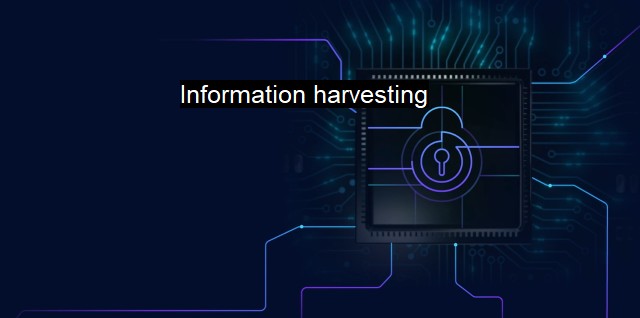What is Information harvesting?
The Importance of Knowledgeable Information Harvesting in Cybersecurity: Realizing the Dangers of Data Harvesting and Web Scraping
Information harvesting refers to the repertoire of practices and approaches employed by cybercriminals or malevolent software to procure or capture personal and sensitive data from individuals, organizations, systems, or networks. The acquired information can be utilized for a spectrum of malicious purposes ranging from performing identity theft, generating spam, conducting phishing attacks, distributing malware, executing unauthorized financial transactions and other offensive activities.Cybersecurity attempts to counteract these harmful activities. It is fortified by a suite of tools, technologies, best practices, and effective measures aimed at preserving the systems and networks' integrity and confidentiality. One key module in this defense architecture is the dynamic role played by antivirus software. Antivirus software employs intricate and sophisticated detection schemes to locate and neutralize a host of malware, including those instrumental in information harvesting.
Information harvesting can materialize in several forms and tactics. At the forefront are phishing schemes, substantially aided by modern tech and social engineering. Cybercriminals masquerade as genuine entities sending emails or messages under pretense urging the recipient to click a link or open an attachment. These actions can either release infestations of unwanted malware into the system or direct the end-user to a falsified website where their details, such as login credentials, credit card numbers, are stolen.
Another prevalent approach is through spyware, a category of software specifically designed to collate data on users’ online activities and sensitive information covertly. This customarily occurs in the background, keeping the unsuspecting end-user largely unaware of the compromised state of their digital unit.
Keyloggers, another weapon in an immoral hacker arsenal, takes it a step further by recording each keystroke the user makes, which can potentially unearth passwords, financial data, and other valuable personal information. Meanwhile, cookie theft and session hijacking are slightly different avenues through which these data pilfers operate. They particularly aim to hijack virtual identities, enabling the impersonation of the user to execute significant transactions or manipulate valuable data.
Ramifications of information harvesting are catastrophic. They encompass not only financial devastation but also include potential damage to reputation, erosion of user trust, significant disruption in operations, and a flurry of legal implications connected to evasion of privacy. It indirectly mangles the digital economy by augmenting the vulnerability of online transactions and networks.
In this context, cybersecurity generators like antivirus software operate as the bulwarp against such illicit cyber-activities. Antivirus aids in inspecting, identifying, segregating, and eliminating suspicious activities or harmful pieces of software like trojans, worms, keyloggers, etc., which are often the tools utilized for information harvesting.
These software systems are armed with features like firewalls, email protection, browser cleansing, password manager, VPN service, etc. They employ machine learning and predictive analytics to accentuate the ability to anticipate major threats. Apart from direct protective functions, antivirus applications foster a culture of security through regular notifications and updates.
Information harvesting epitomizes the malevolent aspect of technological progress. It underlines the continuous significance and need for cybersecurity features coupled with the critical role played by antivirus software. This dual layer of safeguard commencing at the interface level and seeping to the depths of the overarching networks and systems is imperative to steer against the tide of challenges cascading from information harvesting practices. Therefore, while technology continues to drive growth and opportunities, maintaining a conscientious attitude toward information security is instrumental in leveraging technology without negative side effects.

Information harvesting FAQs
What is information harvesting?
Information harvesting is the process of collecting sensitive and confidential data from computer systems and networks through various methods, including social engineering and malware attacks.How can information harvesting affect cybersecurity?
Information harvesting can compromise cybersecurity by providing attackers with access to sensitive data, which can be used for identity theft, financial fraud, and other malicious activities. It can also lead to the installation of malware or other types of cyberattacks.What are some common methods used for information harvesting?
Common methods used for information harvesting include phishing, spear-phishing, social engineering, and the use of malware such as keyloggers, Trojans, and remote access tools.How can antivirus software help in preventing information harvesting attacks?
Antivirus software can help prevent information harvesting attacks by detecting and removing malware from systems and networks. It can also block malicious emails and websites that could lead to information harvesting attacks. Additionally, antivirus software can provide real-time protection against new and emerging threats.| | A | | | B | | | C | | | D | | | E | | | F | | | G | | | H | | | I | | | J | | | K | | | L | | | M | |
| | N | | | O | | | P | | | Q | | | R | | | S | | | T | | | U | | | V | | | W | | | X | | | Y | | | Z | |
| | 1 | | | 2 | | | 3 | | | 4 | | | 7 | | | 8 | | |||||||